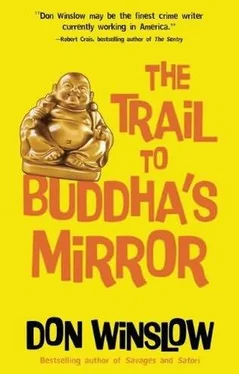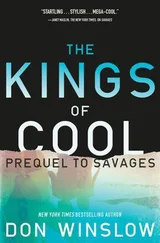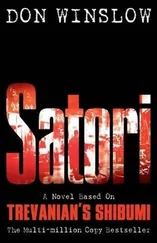Don Winslow - The Trail to Buddha_s Mirror
Здесь есть возможность читать онлайн «Don Winslow - The Trail to Buddha_s Mirror» весь текст электронной книги совершенно бесплатно (целиком полную версию без сокращений). В некоторых случаях можно слушать аудио, скачать через торрент в формате fb2 и присутствует краткое содержание. Жанр: Триллер, на английском языке. Описание произведения, (предисловие) а так же отзывы посетителей доступны на портале библиотеки ЛибКат.
- Название:The Trail to Buddha_s Mirror
- Автор:
- Жанр:
- Год:неизвестен
- ISBN:нет данных
- Рейтинг книги:3 / 5. Голосов: 1
-
Избранное:Добавить в избранное
- Отзывы:
-
Ваша оценка:
- 60
- 1
- 2
- 3
- 4
- 5
The Trail to Buddha_s Mirror: краткое содержание, описание и аннотация
Предлагаем к чтению аннотацию, описание, краткое содержание или предисловие (зависит от того, что написал сам автор книги «The Trail to Buddha_s Mirror»). Если вы не нашли необходимую информацию о книге — напишите в комментариях, мы постараемся отыскать её.
The Trail to Buddha_s Mirror — читать онлайн бесплатно полную книгу (весь текст) целиком
Ниже представлен текст книги, разбитый по страницам. Система сохранения места последней прочитанной страницы, позволяет с удобством читать онлайн бесплатно книгу «The Trail to Buddha_s Mirror», без необходимости каждый раз заново искать на чём Вы остановились. Поставьте закладку, и сможете в любой момент перейти на страницу, на которой закончили чтение.
Интервал:
Закладка:
“In Hong Kong.”
Cries of “Fuck me, fuck me, fuck me!” seemed to be coming out of Mark Chin’s chest, as if he were the dummy in an obscene ventriloquist’s act.
“No big deal,” he said.
“Great.”
The video rose to an ear-shattering crescendo of passion as Chin asked, “It’s about the woman, isn’t it?”
“What woman?”
“Room ten-sixteen, the incredibly gorgeous Chinese woman.”
The video shut off in mid-climax. Chin stuck another token in the slot and changed channels. Two women in a steam room were making tentative advances. Their quiet conversation was a welcome relief.
“That Pendleton is a lucky guy,” Chin continued. “Me, I would not mind a piece of that luck.”
Neal felt himself flush with anger. What is this, he thought, jealousy?
“So what is he?” Chin asked. “The chemist?”
Now how the hell would you know that? Neal wondered. He didn’t answer, but let the soft sighs coming from the video fill the silence.
Chin said, “Pendleton tests the heroin? Tells the boss, ‘This is good, this is not so good’? He makes a nice salary, plus benefits? She’s one of the bennies? You don’t want to mess with that, that’s tong business. Big time.”
“I have to find her.”
Yeah, I do. Find her to warn her. Find her to ask her some questions. Find out what the hell is going on. Find out how to come out of this alive.
“What, you’re in love?”
Why is this so obvious to everybody but me?
“Yeah, okay.”
Chin shook his head disgustedly. The two women on the video began a fresh erotic encounter.
“It’s your funeral,” Chin said. “When are you leaving?”
“As soon as possible.”
“Before your friend finds you?”
“How hard is it to disappear in Hong Kong?” Neal asked.
“It can’t be too hard. People disappear in Hong Kong every day.”
Neal opened his bag and came out with a package of cash. He counted ten hundred dollar bills out and handed them to Chin.
“Disappear me.”
Chin folded the money into his pants pocket. The old saying was right, he thought-it’s amazing how lucky you get when you work hard. But he wasn’t that interested in old sayings. His metaphor of preference was western chess, and he knew that to capture the opponent’s queen, you had to move a pawn forward. He pointed both open palms toward Neal, closed his fingers, and snapped them open again.
“Presto!”
As he and Neal left, the warm ripple of a woman’s laughter followed them.
5
Xao Xiyang took the lid off the mug and sipped at the green tea. His neck ached, his eyes hurt, and even the fine quality of this particular tea did nothing to change the stacks of figures on his desk.
He sat back in his chair and lit a cigarette. The acrid taste of the cheap tobacco burned his mouth. His lesser colleagues teased him-as regional party secretary he could easily have used the “back door” to procure as many Marlboros as they could bring from Hong Kong-but the habit of caution was still with him. He had known men to be imprisoned during the Great Proletarian Cultural Revolution for far lesser “crimes” than smoking American cigarettes.
He took off his glasses and wiped them on the short sleeve of his cheap cotton shirt. He could smell his own stale perspiration in his armpits. He glanced at his watch and realized that he had been poring over the agricultural statistics for seven hours. And still they didn’t change.
Ninety-seven million people in this province, Xao thought. More than in the entire Han Dynasty at its height, more than the Ming, more than Rome. I am responsible for ninety-seven million people. And I don’t know how to feed them. Here, in the so-called Rice Bowl of China, we can no longer feed ourselves. A cultural revolution indeed.
His assistant, Peng, currying favor, had repeated to him the flattering play on words that was being repeated in the teahouses: “If you want to eat, go see Xao Xiyang.” And it was true that he had made some reforms, throwing out some of the ideologues who were so badly mismanaging some of the production teams. But “some” was not good enough. The reforms had to be systemic.
And the system was so idiotic, Xao thought as he took another long drag on his cigarette. Insane, really. And I blame you, old friend, he thought, looking at the Chairman’s portrait that hung on the office wall, as it did on all office walls.
They had begun as tongmen-jr-comrades-although the Party cliche was a curse on his tongue now. He had looked up to the Chairman then, almost as an older brother. He had joined the Party, fought the Kuomintang, lost, and joined the Chairman on the Long March. How clear things seemed in those days, how clear and pure in the crystalline air of the mountains, when he and the Chairman and all the rest were fighting to build a new China in a new world.
And the fighting. Fighting the Kuomintang, and then the Japanese, and then the Kuomingtang again. Fighting with the Chairman’s guidance, under his precepts of guerrilla war. Like fish swimming in the sea of the people. And as they fought, they liberated, came to control vast areas of the country. And they threw out the landlords and gave the land to the peasants, then recruited the peasants for the army. And he remembered that when they retreated from a village, the Kuomingtang would come back in and shoot all the peasants who had been left behind.
What fighting he had seen! Bodies stacked like rice hulls along the side of the road. Entire villages beheaded by the Japanese. He remembered the Japanese patrol they had pinned down in the mountain pass-they had picked them off one by one over the course of three days. When finally they went to loot the bodies, they saw that some of the Japanese had not been shot at all, but had frozen to death, their bodies stuck to the rocks by ice, their fingers frozen to their rifle triggers.
And in those same mountains he had met her. She was a courier, a message runner… a spy. She risked torture at the hands of the Japanese, but she never flinched, and he had heard of her before he met her. He chuckled at the memory. They hadn’t called it “love,” that would have been too romantic and decadent. No, they had called it a “oneness of spirit in revolutionary fervor”-but it was love. Such beauty… such soul…
They married in a high mountain meadow and honeymooned in a tent under tall cedars. Then they went back to their separate duties. He was terrified for her, terrified for himself that she might never return from her dangerous missions. For five years they made infrequent, brief rendezvous-passionate couplings in peasant huts or tents, even caves. And when the Japanese had been beaten, and the Kuomintang destroyed, they met in the joyous celebration in Tiananmen Square and never separated again. Started a life and raised a family and never separated again until…
Xao Xiyang lit another cigarette. I must be getting old, he thought. I seem given to the old man’s habit of living in the past, in the realm of memory. But you, old friend, he thought as he looked again at the portrait, you are now in the realm of the shadows. Thank you. The last, best thing you could do for us was to die. It is only a shame you didn’t do it sooner. You should have died on the day of victory, when we all stood on Tiananmen Gate and proclaimed the republic. The New China.
Before you decided to become an emperor.
Xao took another sip of the green tea and pronounced another curse on the head of his old friend. He pronounced it in the name of twenty million of the dead. Twenty million peasants, twenty million of “the people,” who had starved in the Chairman’s Great Leap Forward. “Great Leap,” indeed-the great leap from this world to the next. The next world, he thought. Good Marxist that I am, I don’t believe in the next world. But I will see you in hell, old friend.
Читать дальшеИнтервал:
Закладка:
Похожие книги на «The Trail to Buddha_s Mirror»
Представляем Вашему вниманию похожие книги на «The Trail to Buddha_s Mirror» списком для выбора. Мы отобрали схожую по названию и смыслу литературу в надежде предоставить читателям больше вариантов отыскать новые, интересные, ещё непрочитанные произведения.
Обсуждение, отзывы о книге «The Trail to Buddha_s Mirror» и просто собственные мнения читателей. Оставьте ваши комментарии, напишите, что Вы думаете о произведении, его смысле или главных героях. Укажите что конкретно понравилось, а что нет, и почему Вы так считаете.












